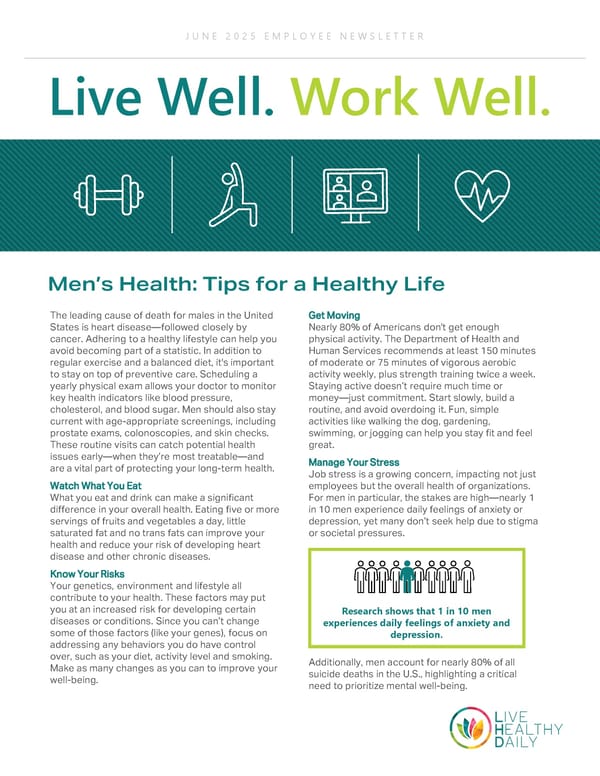Men's Health: Tips for a Healthy Life
J U N E 2 0 2 5 E M P L O Y E E N E W S L E T T E R Live Well. Work Well. The leading cause of death for males in the United States is heart disease—followed closely by cancer. Adhering to a healthy lifestyle can help you avoid becoming part of a statistic. In addition to regular exercise and a balanced diet, it's important to stay on top of preventive care. Scheduling a yearly physical exam allows your doctor to monitor key health indicators like blood pressure, cholesterol, and blood sugar. Men should also stay current with age-appropriate screenings, including prostate exams, colonoscopies, and skin checks. These routine visits can catch potential health issues early—when they’re most treatable—and are a vital part of protecting your long-term health. Watch What You Eat What you eat and drink can make a significant difference in your overall health. Eating five or more servings of fruits and vegetables a day, little saturated fat and no trans fats can improve your health and reduce your risk of developing heart disease and other chronic diseases. Know Your Risks Your genetics, environment and lifestyle all contribute to your health. These factors may put you at an increased risk for developing certain diseases or conditions. Since you can’t change some of those factors (like your genes), focus on addressing any behaviors you do have control over, such as your diet, activity level and smoking. Make as many changes as you can to improve your well-being. Get Moving Nearly 80% of Americans don't get enough physical activity. The Department of Health and Human Services recommends at least 150 minutes of moderate or 75 minutes of vigorous aerobic activity weekly, plus strength training twice a week. Staying active doesn’t require much time or money—just commitment. Start slowly, build a routine, and avoid overdoing it. Fun, simple activities like walking the dog, gardening, swimming, or jogging can help you stay fit and feel great. Manage Your Stress Job stress is a growing concern, impacting not just employees but the overall health of organizations. For men in particular, the stakes are high—nearly 1 in 10 men experience daily feelings of anxiety or depression, yet many don’t seek help due to stigma or societal pressures. Additionally, men account for nearly 80% of all suicide deaths in the U.S., highlighting a critical need to prioritize mental well-being. Men’s Health: Tips for a Healthy Life Research shows that 1 in 10 men experiences daily feelings of anxiety and depression.
 Men's Health: Tips for a Healthy Life Page 2
Men's Health: Tips for a Healthy Life Page 2